Thursday,January 28, 2021 / 1:00PM / By Proshare Research / Header ImageCredit: EcoGraphics
Executive Summary
"Rule number one: Don't lose money. Rule number two: Don't forget rule number one." Warren Buffett
Economies globally in 2020 were caught in the centre of a vortex of problems ranging from economic lockdowns to supply chain disruptions, oil price disturbances, and healthcare instabilities necessitating furloughs, salary cuts, and layoffs. All these events had differential impacts on markets ranging from equities to fixed income securities, commodities, and hybrid market instruments.
Indeed, for Nigeria, the capital market saw fixed income yields flatten as investors piled into the market to avoid losses in equities but by Q2 2020 the fixed income market unraveled as yields started tumbling to below 1% per annum. To make matters worse domestic inflation rate climbed steadily thereby eviscerating real domestic returns on investment.
As things would have it, the global markets for metals equally stalled as grains and other commodities felt the brunt of disrupted travels and supply chain networks. The commodities market became 'choppy' along with a declining trend until Q4 2020 when markets started to look up with hopes of a faster-than-expected recovery and the announcements of vaccines to combat the COVID-19 virus.
The news of a viable vaccine against the virus fed into global equities markets in Q4 2020 and saw stock prices edge up, especially in Asia and some parts of Africa including Nigeria. The Nigerian equity market rose as investors found themselves trapped in a tight asset position as foreign investors could not make their exit from the Nigerian equity market as they had the niggling challenge of converting from the naira to harder currencies. To make matters worse, the low rates available in the fixed income and local money markets crushed potential investment yield. This sent both local and foreign investors scurrying back to the equities market as it represented the best temporary haven for investible funds.
Table 1: Foreign Investors
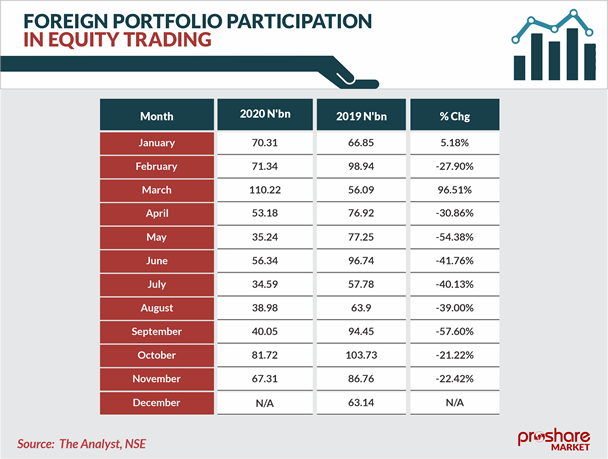
The Nigerian Stock Exchange All Shares Index (NSEASI) rose by +50.3% year-to-date (YTD) by December 2020. This represented one of the highest equity market returns for any of the global stock markets in 2020. Foreign investors are still bent on leaving the local Nigerian market and the current market yield may at best be considered tentative. However, local investors may be less finicky as the NSE appears like a decent long-term play, especially if the national output, GDP, growth picks up in 2021. In Q2 2020 GDP growth was -6.10% but improved to -3.62% in Q3 2020, based on the +1.87% GDP growth in Q1 2020, local analysts expect 2020 full-year GDP growth to settle between -3.68% and -2.93%. Since there was no lockdown in Q4 2020 and factories had started to ease into their pre-pandemic routine activities, growth would likely rest slightly above -3.29% in Q4 2020.
Table 2: NSEASI Performance Review 2020
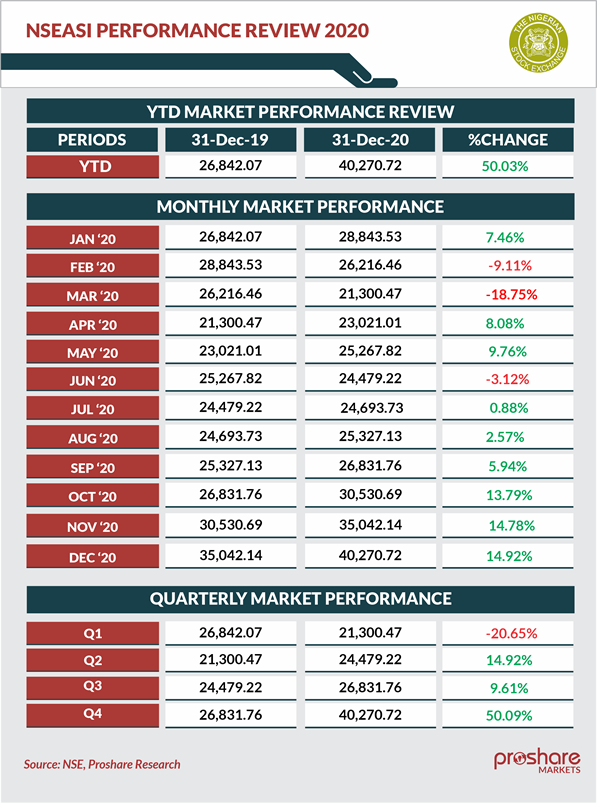
The International Monetary Fund (IMF) expects Nigeria's GDP growth to be roughly -4.3% in 2021. The pessimism may rest on the expectations of a slow distribution of COVID-19 vaccines and a weakening of international oil prices. However, these outcomes are unlikely or at worst only moderately constraining.
The distribution of COVID-19 vaccines in Q1 2021 may be slow but would likely pick up in Q2 2021, meaning renewed extended lockdowns are not expected. With factories and businesses able to continue their businesses, although, below pre-pandemic levels, the country's GDP numbers would do better in Q1 2021 than in the last three quarters of the year 2020. This means that the ASI may continue its bullish trajectory and jump through a few higher-performance hoops in Q1 and Q2 2021.
On the converse side, analysts expect investors to sell off fixed-income assets as yields take a dip. Sell-offs would likely bring down bond prices and improve yields gradually, but a lot would depend on the fiscal authorities and the pressure they come under to service debt and fund the government's budget deficit. Prevailing average international oil prices would be a major unknown variable in the equation of fiscal balance in 2021. Lower prices would widen the deficit and raise coupon rates while higher prices would lower the deficit and sumo-slam the coupons on fixed income securities.
Brent oil price has recently skimmed past US$55 per barrel as against the 2021 budget benchmark price for Nigeria's Bonny light of US$40 per barrel. Bonny light typically sells at a premium of between US$2 per barrel and US$3 per barrel above Brent and this should provide a desirable cushion for budget planners if the trend is sustained.
Chart 1: Brent Crude Price Movement (Jan- Dec)
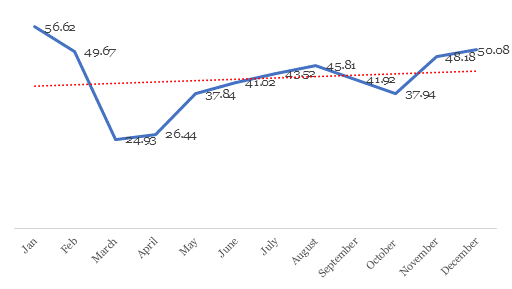
Source: Bloomberg, Proshare Research
A stronger fiscal position and a faster accumulation of foreign reserves would likely strengthen the naira in foreign exchange markets and keep treasury yields low which would spur investors to pivot to equities more permanently in 2021.
While this may go on in the treasury and currency markets, the commodities market would likely reflect an upward orientation in 2021 as it did in 2020 with the AFEX commodities Index rising by +98.5% YTD in December 2020 despite the challenges that accompanied the COVID-19 pandemic. If a lockdown does not occur in 2021 the AFEX Index should skip over a year-to-date yield of 105.1% at the end of 2021. However, if the coronavirus escalates in Q1 2021 and the government decides that a lockdown has become necessary, then the AFEX Index could be sliced down a notch, how far down it will go would depend on the length of the lockdown. The longer the lockdown lasts the lower the Index will slide.
Chart 2: ACI Composite M-o-M(Jan- Dec)
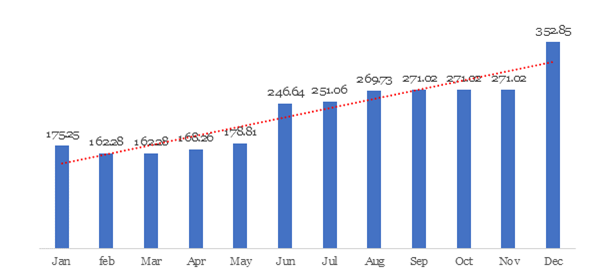
Source: AFEX, Proshare Research
During 2020 there were a few private equities (PEs) play, but the year saw a general downturn in Private Equity Issues compared to 2019. The presence of the COVID-19 pandemic caused significant disruption to capital raise activities in previous year.
The report in section 1 starts with a general overview of global equities market in 2020 and dovetails into a review of the status of African markets before narrowing down to the primary events that shaped activities on the floor of the Nigerian Stock Exchange and the NASD OTC market. The Nigerian Stock Exchange's All Shares Index (ASI) grew by +50.3% by year end which made the exchange the highest yielding on the African continent in 2020 despite a recession that led to production shutdowns and job losses. Most of the market gains took place in Q3 and Q4 of the year. The market's highest loss was in the thick of the COVID-19 pandemic in March 2020 when it tumbled by -18.75%. By July 2020, the journey along a bullish reversal was set with the market rising by over +14% in both November and December 2020.
The section reviews the NSE's different market segments and assess performance in different traded asset classes. The section looks at penny stocks on the NSE and stocks that seem to have paused in their trading. To give fillip to technical market considerations this section of the report looks at equities 52-week highs and lows and gives analysts insight into individual stocks bullishness or bearishness over the last twelve months.
Table 3: Penny Stocks by Sector
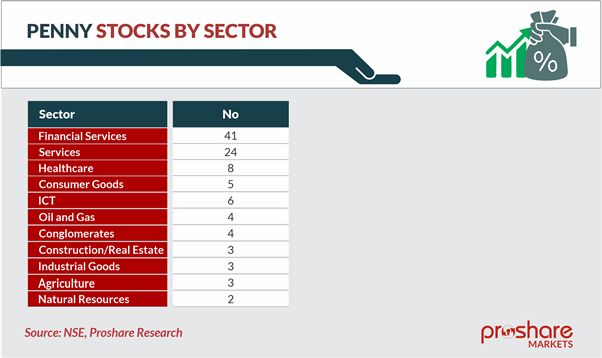
Section 2 of the report deals with matters concerning fixed income investments and the local currency market. Fixed income instruments saw their yields squashed during the year as investors dissatisfied with falling yields pulled the rug from under the market and reverted to equity investments, especially between Q3 and 4 2020. Market yields on fixed income assets such as treasury-bills barely skimmed 1% for most bills and 3% for most bonds. A rebound in global economies would be expected to encourage equity investments and witness growing short sales of bills as investors vote with their feet out of safe-haven assets and take on riskier investment classes. The currency markets according to the report would see investors pull away from currencies such as the United States dollar and British Pound as investors feel confident about currency assets such as the Japanese Yen or the Chinese Yuan. The report noted that in 2021, "There will be a positive appetite for risky currencies especially currencies of emerging markets, which will likely trend upwards if the current momentum of recovery is sustained, however, a lockdown because of the further spread in the new strain of the coronavirus would reverse the outlook".
Other asset classes such as mutual funds and commodities were treated in section 3 of the report. The mutual funds' performance reflected the underlying stocks in each fund portfolio with equity funds showing strong growth as stocks saw aggressive upward momentum in Q3 and Q4 2020. The net asset value (NAV) of mutual fund assets were growth-facing even for the funds with large fixed-income positions. According to the report, "Fixed income funds grew significantly by +204.44% with a total NAV of N422.66bn as of 24 Dec 2020". Mixed funds had a tougher time of mining results, the report observed that, "For the Mixed Funds, the total NAV for this segment grew Y-o-Y by +23.51% from N23.85bn recorded in Dec 2019 to N29.46bn as of 24 Dec 2020". Despite some hiccups, the mutual market had a decent year of performance in 2020.
Table 4: Fixed Income Funds Returns 2020
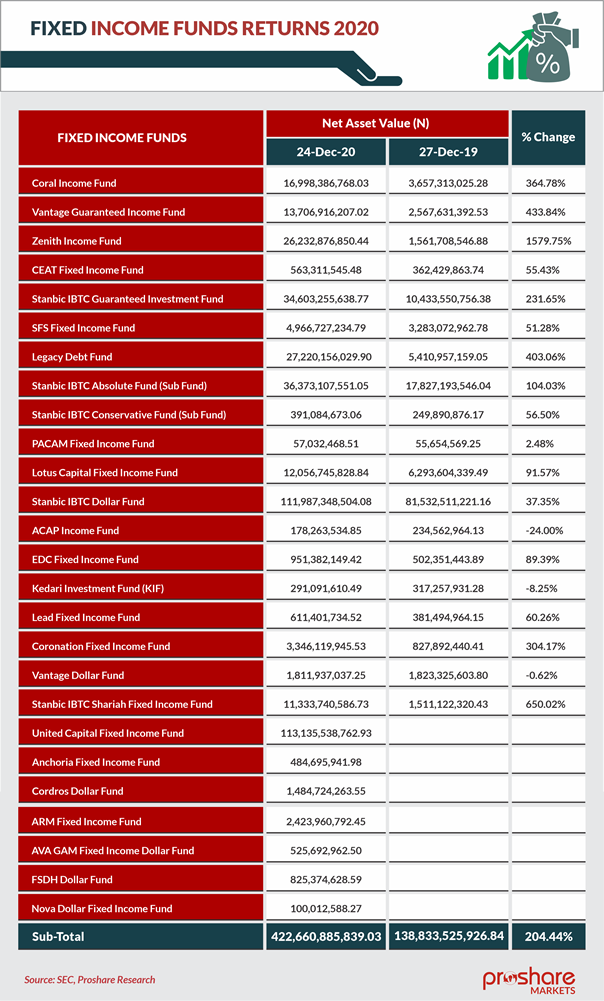
Table 5: Mixed Funds Returns 2020
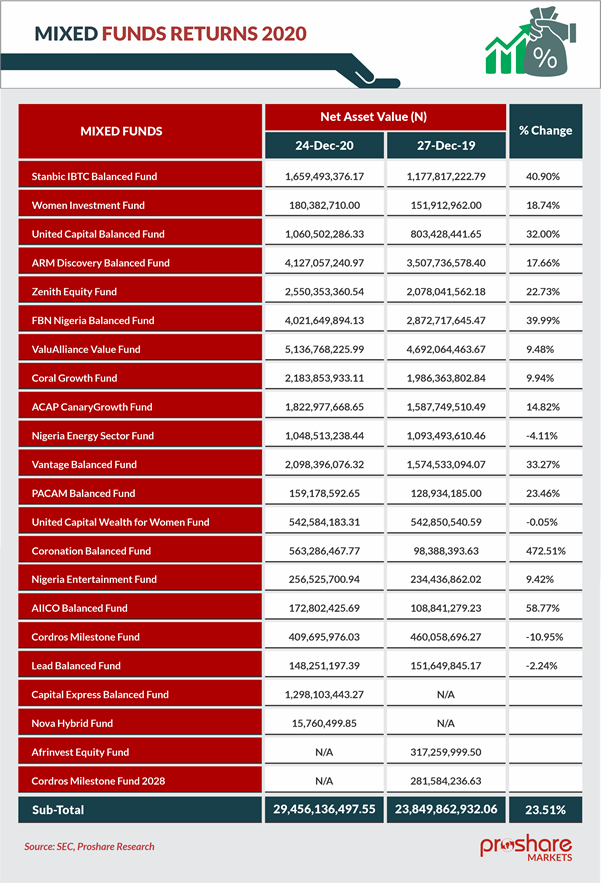
Another alternative asset class was commodities with oil being the cynosure of investors' interest as oil prices went down and up in 2020 like a seesaw. Towards the end of 2020 international oil prices climbed steadily as the Organisation of petroleum exporting countries (OPEC) and its OPEC-plus allies increasingly stood together rather than apart in determining global supply cutbacks and tolerable international oil prices. The collaboration between the two groups helped moderate price movements in the last weeks of 2020 but the rise in oil prices to over US$57 per barrel for Brent Oil is raising growing anxiety in major global manufacturing economies as energy costs threaten to spike. According to the report, "In October 2020, Oil price took a hit yet again, crashed to its lowest price level since March as new lockdowns and restrictions were re-imposed to combat the second wave of the coronavirus pandemic.
Again, OPEC and non-OPEC allies met in December to discuss new output policies to help support oil prices. An agreement was reached, and it was decided that another 500,000-bpd output cut would begin from January 2021".
However, beyond oil market mood swings the non-oil market equally saw some excitement. The report noted that the country's premier commodities exchange, AFEX, saw witnessed a mild bump at the beginning of the year 2020, according to the report "The AFEX composite index (ACI) opened at a value of 175.25 points in January 2020, tumbling to 162.28 points in February. Market activity in February for maize, soybeans, and paddy rice was characterized by a marked increase in price volatility for all commodities in the local markets as stakeholders engaged in bargain hunting".
Chart 3: ACI Composite M-o-M(Jan- Dec)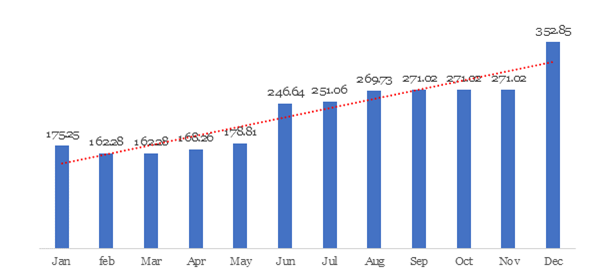
Source: AFEX, Proshare Research
Section 4 of the report reviewed regulatory actions in the year looking at financial market regulators such as the Securities and Exchange Commission (SEC), the Nigerian Stock Exchange (NSE), the FMDQ exchange, and the NASD. The section also looked at interventions by the Central Bank of Nigeria (CBN), the Asset Management Company of Nigeria (AMCON) and the various trade groups. This section provided a treasure trove of information on policy positions by the various capital and money market authorities in 2020.
Technology has become crucial to how the Nigerian economy will fare over the next decade. Section 5 looks at the role of technology in the emerging market for the trading of equity, fixed income, and other assets. The report observes that, "With a younger profile of investors dependent on internet access and information, investor expectation has shifted amongst a younger demography. Investors among the new generation of Nigerians are quick to make global comparisons of returns and risks on the fly at the flick of a button".
The generation Y and X investors are netizens unique human personalities that play out their fantasies, desires, needs and expectations on the open gallery of the world wide web. They are impatient, at times impulsive and hugely idealistic. These facts compel CMOs to rethink, reimagine and re-strategize service-delivery platforms and products. The younger generation of investors expect to have best-in-class information as soon as possible and with primary datasets that enable them to make educated judgments. According the report, "this will mean that CMOs will have to scaleup their service point responses and improve their communication with clients using cutting-edge Artificial Intelligence (AI) software. In addition, the broad and speedy access of clients to market information across global jurisdictions suggests that more investors would want to trade assets across countries".
Watch Video
DownloadablePDF - The 2020 Nigerian Capital Market Report
1. CompleteReport: The Nigerian Capital Market Report 2020: Leveraging a Crisis - Jan 28, 2021
2. Executive Summary: The Nigerian Capital Market Report2020: Leveraging a Crisis - Jan 28, 2021
Related Links
1. NCM 2020:Technology and the Nigerian Capital Market
2. NCM 2020:Regulatory Governance in 2020
3. NCM2020: Energy Commodities Took a Big Hit in 2020
4. NCM 2020: Bond FundsGrew By 443.80% YoY in 2020
5. NCM2020: Lower FX Earnings Widened the Gap Between Two Markets
6. NCM2020: FGN Eurobond Was Driven by Movement in Oil Prices and COVID-19 Pandemic
7. NCM 2020: TreasuryBills Fell to a Record Lows in 2020
8. NCM2020: Yields in the Fixed Income Market Took a Downward Trajectory in 2020
9. NCM2020: Top Ten Moments in the Nigerian Capital Market in 2020
10. NCM 2020: NASD USIClosed Green in 8 Out of 12 Months in 2020
11. NCM2020: Extracts of Financials of Quoted companies - DANGCEM Tops on Revenue andPAT
12. NCM2020: Agriculture Sector - OKOMUOIL Tops on EPS and PAT Margin
13. NCM 2020: HealthcareSector - NEIMETH Tops on ROE and PAT Margin
14. NCM2020: Industrial Goods Sector - DANGCEM Tops on EPS as BUACEMENT Tops on PERatio
15. NCM2020: Oil and Gas Sector - TOTAL Tops on PE Ratio as JAPAULOIL Tops on PATMargin
16. NCM2020: Consumer Goods Sector - NESTLE Tops on EPS as DANGSUGAR Tops on PAT Margin
17. NCM 2020: FinancialServices Sector - NESF and STANBIC Top on EPS
18. NCM2020: Sectoral Market Capitalisations: Oil and Gas Records - 20.62% Decline in2020
19. NCM2020: A Review of Gote and Toni Indices in 2020
20. NCM 2020: NSE Records1 New Listing to 5 Delistings in 2020
21. NCM2020: Growth of Securities Listed on NSE - Total Securities Listed Increased by0.55%
22. NCM2020: 23% of Listed Companies on NSE on Pause in 2020
23. NCM 2020: 84 StocksAre Off 52-Week Highs as 85 Near 52-Week Lows
24. NCM2020: Forty-one Financial Services Stocks Are Penny Stocks in 2020
25. NCM2020: NSEASI Performance Review and How Each Company Fared in 2020
26. NCM 2020: MarketRecords 57 Gainers to 66 Losers in 2020
27. NCM 2020: ForeignPortfolio Participation in Equity Trading Dropped from March to November 2020
28. NCM2020: Trading Statistics in 2020 - Market Volume Increased by 21.69%
29. NCM2020: NSE Market CAP Closed at US$55bn Below the Peak of US$84bn Recorded in2013
30. NCM2020: NSEASI Closed Green in 9 Out of 12 Months in 2020
31. NCM2020: Markets Were Volatile Globally in Year 2020 as COVID-19 Pandemic InducedUncertainty
32. The NigerianCapital Market Report 2020: Leveraging a Crisis
Monthly NCM
1. The November2020 Nigerian Capital Market Service Report - Proshare
2. The October 2020 Nigerian Capital Market Service Report -Proshare
3. The September 2020 Nigerian Capital Market Service Report- Proshare
4. The August 2020 Nigerian Capital Market Service Report -Proshare
5. The July 2020 Nigerian Capital Market Service Report -Proshare
6. The June 2020 Nigerian Capital Market Service Report -Proshare
7. The May 2020 Nigerian Capital Market Service Report -Proshare
8. The April 2020 Nigerian Capital Market Service Report -Proshare
9. The March 2020 Nigerian Capital Market Service Report -Proshare
10. The February 2020 Nigerian Capital Market Service Report -Proshare
11. The January 2020 Nigerian Capital Market Service Report -Proshare
12. The November 2019 Nigerian Capital Market Service Report -Proshare
13. The October 2019Nigerian Capital Market Service Report - Proshare
14. The September 2019 Nigerian Capital Market Service Report- Proshare
15. The August 2019 Nigerian Capital Market Service Report -Proshare
16. The July 2019 Nigerian Capital Market Service Report - Proshare
17. The June 2019 Nigerian Capital Market Service Report - Proshare
18. The May 2019 Nigerian Capital Market Service Report - Proshare
19. The April 2019 Nigerian Capital Market Service Report - Proshare
20. The March 2019 Nigerian Capital Market Service Report - Proshare
21. The February2019 Nigerian Capital Market Service Report - Proshare
22. The January 2019Nigerian Capital Market Service Report - Proshare
Annual Reviews & Outlooks
1. NCM2020 - Fin. MKT inTransition: Understanding Past Uncertainties; Preparing for New Possibilities
2. Surviving Uncertain Times inthe Nigerian Financial Market
Special Reports & Publications
1. NSETen Years After a Takeover: The Good, The Bad and Undecided
2. NSEPost Takeover: A Journey Through Time
3. NSE PostTakeover: The Story of Then and How
4. NSEPost Takeover: Market as a Metaphor
5. NSE PostTakeover: The Imperatives of Tomorrow: Myths, Risks and Opportunities
6. NSEPost Takeover: Power Moves -Demutualization and The New Board Games
7. NSEPost Takeover: A Whole New World-Reimagining Endless Possibilities
8. NSEPost Takeover: Back of the Envelope
Online Trading Reports
1. OnlineTrading Ranking Report 2020 - Trading in a Period of a Virus; Building GoodHabits
2. OnlineTrading Ranking Report 2019 - Refining The User Experience; Trends In DigitalTrading
3. Nigerian OnlineTrading Portals Ranking Report 2018
4. NigerianCapital Market and FX Online Trading Portals Ranking Report H2 2017
5. The NigerianCapital Market Online Trading Portals Ranking Report
6. The NigerianOnline Trading Report
CMO Reports
1. Nigerian EquityMarket Outlook: COVID Out, Riots In?
2. NigerianEconomic and Financial Markets: H1:2020 Review and H2:2020 Outlook Opportunityin a Crisis?
3. Nigeria EconomicOutlook 2021: A Shot at Recovery
4. 2021 Outlook -Is The Tunnel Getting Darker or Brighter
5. Nigeria in 2021:Positioning in the New Normal
6. Nigeria 2021Outlook - Navigating Unsteady Terrain
7. Nigeria FY 2021Macroeconomic Outlook - A Break in the Clouds
8. Nigeria 2021Outlook: COVID-19 Recession and the Long Road to Economic Recovery
Selected Articles
1. The Year 2020 in Retrospect: ABleak Year for Households
2. Will Gold Prices Rally in 2021? Here are ItsEbbs and Flows
3. Review of 2020 Activities InThe Islamic Finance Market And The Outlook For 2021
4. Ranking Global Equity Marketsin 2020: NASDAQ Takes The Lead
5. Holiday Blues Dampen TradingActivities for Last Trading Session
6. 2021:President BuhariReaffirms Commitment To A United And Progressive Nigeria
7. Ten Most Capitalised StocksAccount for 83% Contribution to the NSEASI
8. Proshare's New Year Message -Change, Technology, and The New Corporate Calling
News Posts Referenced in the Report
1. NSERevolutionises Public Offerings Subscription with Electronic Platform
2. Finally, NSELaunches the Growth Board with FintechNGR as a Strategic Partner
3. NSEMigrates Four Companies from ASeM to Growth Board
4. Demutualisation:NSE Announces Chief Executives for Emerging Entities
5. NSE Members Assent to Demutualisation Resolutions at COMand EGM
6. COVID-19: NSEActivates 30-day Remote Work Plan; Remote Trading to Continue
7. FGN 14 DayRestriction: NSE to Sustain Remote Trading Amidst COVID-19 Pandemic
8. CAC IssuesGuidelines on Holding of AGMs of Public Companies Using Proxies
9. COVID-19 and AGMby Proxy: Lessons from GTBank Approach
10. Revision ofStamp Duty on NSE Transactions to 0.08% from 0.075% Effective 7th December 2020
11. HM ZainabShamsuna Ahmed Urges IST to Discharge Duties Diligently
12. NSE toRe-Introduce Trading Fees for Securities Traded on the Fixed Income Market
 Lagos, NG • GMT +1
Lagos, NG • GMT +1










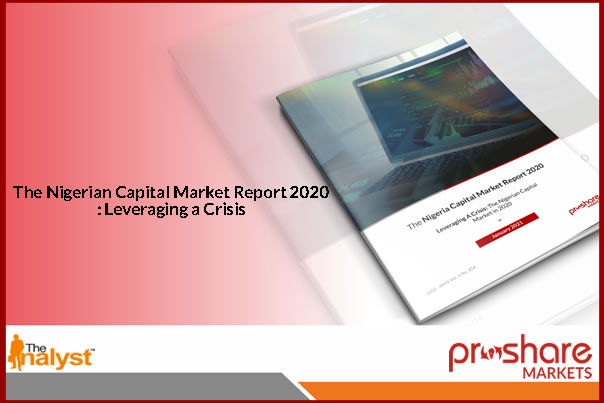
 4504 views
4504 views


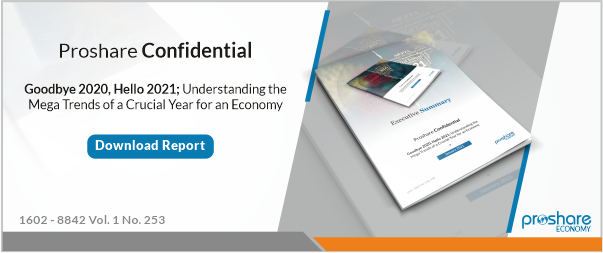
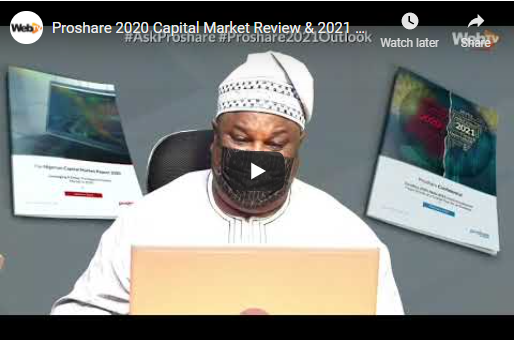






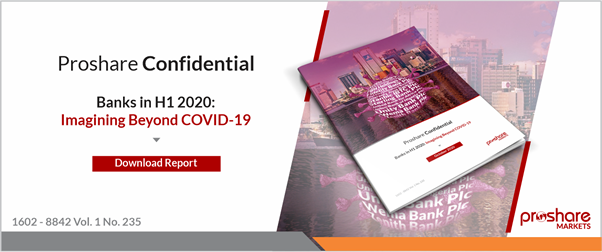

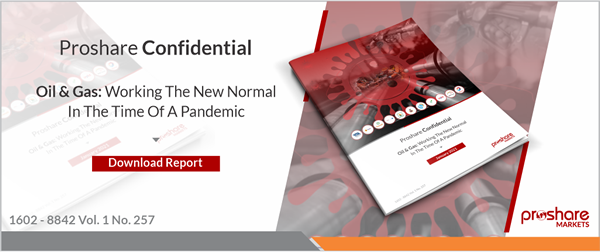
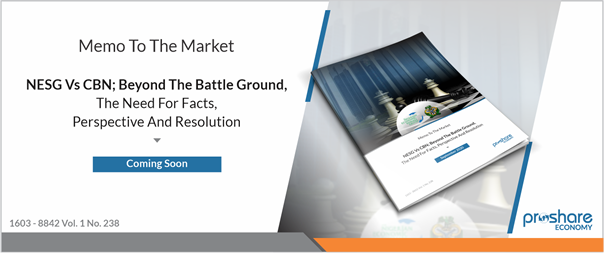





 Sponsored Ad
Sponsored Ad
 Advertise with Us
Advertise with Us









